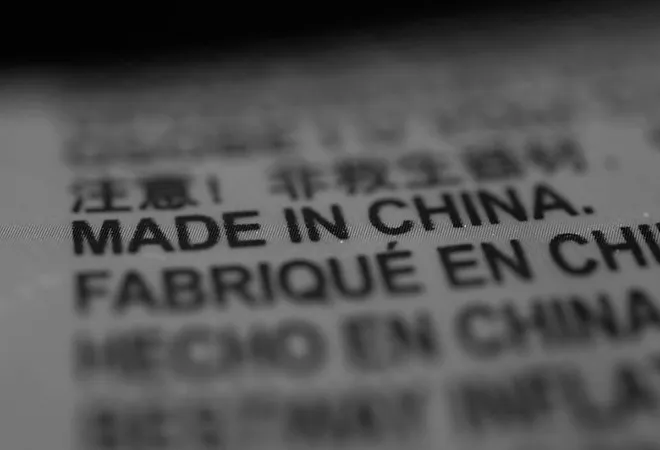-
CENTRES
Progammes & Centres
Location
Chinese advocacy for economic interdependence, owing to its centrality in global supply chains, could be met with a renewed transatlantic consensus centered on China.

Even as the world continues to grapple with the coronavirus pandemic, China has sought to further its strategic aims. In April, China officiated its territorial aggrandisement in the South China Sea by announcing administrative structures to govern much of its nine-dash line claims over the contested Paracels Islands, Macclesfied Bank and the Spratly Islands. Starting mid-April, China stepped up its presence around the disputed Senkaku Islands — setting an all-time high record of operating in the contested space for 65 consecutive days as per the Japanese Coast Guard.
In May, the Chinese National People’s Congress approved a proposal to introduce a contentious national security law in Hong Kong, which would ban “secession, subversion of state power, terrorism, foreign intervention” and permit mainland China’s security apparatus to operate in the semi-autonomous city. Most recently, China and India engaged in a border skirmish which claimed the lives of 20 Indian soldiers, in an incident reported to be the first such “deadly clash in the border area in at least 45 years.”
"Starting mid-April, China stepped up its presence around the disputed Senkaku Islands — setting an all-time high record of operating in the contested space for 65 consecutive days as per the Japanese Coast Guard."
Amidst its pursuit of long-standing strategic aims however, Beijing’s advocacy for economic interdependence is set to pick up pace.
Over the past three years, US President Donald Trump’s anti-globalism message has been met with increased Chinese calls for economic interdependence. Notably, at the 2017 World Economic Forum, Chinese President Xi Jinping said, “We must remain committed to developing global free trade and investment, (and) promote trade and investment liberalization.” China’s turn as the supposed vanguard for economic interdependence stemmed from its intent to preserve its thirty-year stint as the world’s leading manufacturer against a wave of protectionism.
Over that period, the world’s dependence on Chinese goods either accorded it outright monopoly — like in case of China being the largest producer of tires with an estimated 759.3 million units manufactured in 2019, or handed it crucial leverage points — as with China accounting for 40 percent of the world’s requirement for Active Pharmaceutical Ingredients.
"In a bid to arrest the decline in its prowess as an exporting behemoth, China is set to further its advocacy for global commerce."
Following the coronavirus pandemic however, global sentiment against relying extensively on China for crucial imports is set to rise. (China exports plummet by 17% as coronavirus takes its toll) In addition, nations have also eyed this as an opportunity to encourage the “sell where you make” model, attract lucrative foreign investments, and spur a “manufacturing exodus” from China by offering incentives. Hence, in a bid to arrest the decline in its prowess as an exporting behemoth, China is set to further its advocacy for global commerce.
As other nations’ fight with the pandemic impedes their return to normalcy amidst multinational companies becoming increasingly eager to resume production, China has sought to capitalise on its ‘first mover advantage.’ For instance, by March-end, China had already hailed resumption of economic activity, with the Ministry of Industry and Information Technology claiming that 98.6 percent of industrial firms had resumed work with 89.9 percent of employees returning to their workplaces. However, China’s attempt to sustain its role as the “factory of the world,” could be met with resistance — starting with the consolidation of anti-China political will in the US.
In eyeing its market potentialities, post-Cold War Democrat and Republican administrations prioritised engaging China from an economic standpoint over confronting the strategic challenges it presented. Chiefly, the Bill Clinton administration’s Permanent Normal Trade Relations legislation (which ended US policy of reviewing China’s trade status owing to its record on civil liberties) paved the way for the George W. Bush administration’s facilitation of China’s entry into the World Trade Organisation.
"In recognising the cruciality of blue-collar workers from the industrial mid-West in Trump’s 2016 electoral arithmetic, Democrats have thus come around to supporting Trump’s ‘America First’ approach to China."
The political folly of this approach was apparent with Trump’s 2016 campaign message which attributed the hollowing out of America’s industrial base to past American policymakers’ ambivalence towards China’s rise as a near-peer competitor. In recognising the cruciality of blue-collar workers from the industrial mid-West in Trump’s 2016 electoral arithmetic, Democrats have thus come around to supporting Trump’s ‘America First’ approach to China.
An early sign of a renewed US bipartisanship was apparent with the Democrats’ support for the 2018 round of US tariffs on China. They referred to it as “a leverage point” against China’s “regulatory barriers, localisation requirements, labour abuses, anticompetitive ‘Made in China 2025’ policy and many other unfair trade practices.” After winning control over the US House of Representatives in the 2018 midterms, Democrats continued their support with complementing initiatives. For instance, even as House Speaker Nancy Pelosi led the charge on assuaging European concerns on fraying transatlantic ties under Trump, her February 2020 visit across the Atlantic saw her to be one with Trump's campaign against nations opting for Chinese telecoms gear giant Huawei’s 5G propositions.
 An early sign of a renewed US bipartisanship was apparent with the Democrats’ support for the 2018 round of US tariffs on China. Image © Bastian Greshake Tzovaras/Flickr
An early sign of a renewed US bipartisanship was apparent with the Democrats’ support for the 2018 round of US tariffs on China. Image © Bastian Greshake Tzovaras/Flickr
Furthermore, in reinstating focus on China’s civil liberties record, the House passed the Hong Kong Human Rights and Democracy Act and the Tibetan Policy and Support Act. Amidst the pandemic, House Democrats have even doubled down to pass the Uyghur Human Rights Policy Act. Finally, they are reportedly now also considering the recently approved (Republican-held) Senate bill on delisting noncompliant Chinese companies from US stock exchanges.
Under Trump, transatlantic rifts have widened on account of his decision to view European economies as trade competitors, the US’ withdrawal from the Iran Nuclear Deal and increased pressure on European nations to raise their defence commitments. Europe’s relationship with China has also been a sticking point. For instance, when the UK’s Boris Johnson government announced that the Chinese telecoms giant would build up to 35 percent of its 5G infrastructure, American legislators warned that the move could endanger US-UK intelligence sharing.
However, now in the wake of rising “backlash among Conservative MPs against Chinese investment and a lack of transparency around Beijing’s handling of the coronavirus pandemic,” Johnson has reportedly asked for draft plans to reduce Huawei’s involvement. Moreover, in “entering a period of realism with China,” Johnson announced the UK could ease visa restrictions and put millions of Hong Kongers on a path to citizenship as Beijing looks to impose the discussed security law. Furthermore, in a recent video meeting between the 27 EU member foreign ministers and US Secretary of State Mike Pompeo, the EU’s Foreign Affairs High Representative Josep Borrell called for “a more robust strategy” on China and underscored the importance for Europe “to stay together with the US in order to share concerns and to look for common ground to defend our values and our interests.”
"Under the tabled proposals, EU officials could force investors to share acquired technology with competitors."
Moreover, beyond rhetoric, the European Union has also sought tighter restrictions against Chinese investments, following rising calls for Europe to have investment safeguards much like the inter-agency mechanism in the US, i.e. The Committee on Foreign Investment in the United States (CFIUS). After last month’s “opportunistic acquisition” of a stake in Norwegian Air by a Chinese government-controlled company, the European Commission announced proposals “intended to prevent foreign investors from using government subsidies to outbid competitors for European assets.”
 When the UK’s Boris Johnson government announced that Huawei would build up to 35 percent of its 5G infrastructure, American legislators warned that the move could endanger US-UK intelligence sharing. Image © Getty
When the UK’s Boris Johnson government announced that Huawei would build up to 35 percent of its 5G infrastructure, American legislators warned that the move could endanger US-UK intelligence sharing. Image © Getty
These proposals evidently pertain to China (which the EU now dubs as a “systemic rival”) given its focus on imposing “conditions on (government) subsidised investors” which through their investments also get their hands on advanced and/or sensitive technology. Case in point, China National Chemical Corp’s 2015 acquisition of Italian tire-giant Pirelli accorded the state-owned entity access to technical knowhow on premium tires. Under the tabled proposals, EU officials could force investors to share acquired technology with competitors.
Hence, increased Chinese advocacy for economic interdependence owing to its centrality in global supply chains, could be met with a renewed transatlantic consensus centered on China.
Dhriti Kamdar is a research intern at ORF.
The views expressed above belong to the author(s). ORF research and analyses now available on Telegram! Click here to access our curated content — blogs, longforms and interviews.

Kashish Parpiani is Senior Manager (Chairman’s Office), Reliance Industries Limited (RIL). He is a former Fellow, ORF, Mumbai. ...
Read More +